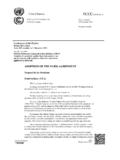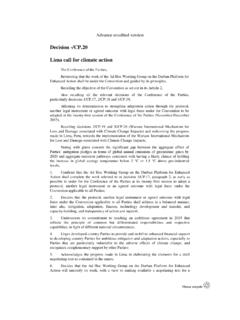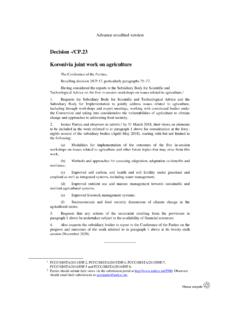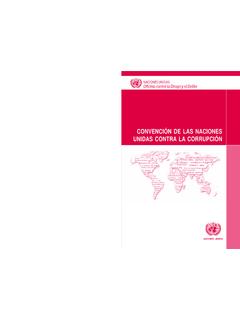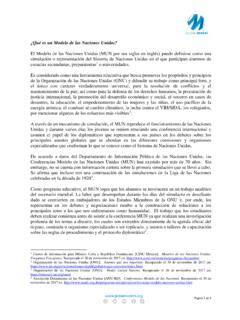Transcription of Sports for Climate Action Framework - UNFCCC
1 Sports for Climate Action Framework Version 1. Background .. 3. Implications of the Paris Agreement for the sport sector .. 3. Opportunity for Sports sector to become a Climate leader .. 4. 2. Sports for Climate Action Principles .. 5. Principle 1: Undertake systematic efforts to promote greater environmental responsibility .. 5. Principle 2: Reduce overall Climate impact .. 5. Measure and understand .. 6. Take Action .. 6. Principle 3: Educate for Climate Action .. 6. Principle 4: Promote sustainable and responsible consumption .. 6. Principle 5: Advocate for Climate Action through 7. 3. Modalities of Work .. 7. Delivery of Sports for Climate Action .. 7. 4. Sports for Climate Action Declaration .. 9. 5. Letter of Commitment .. 10. 1. Background 1. Global warming is placing our planet and future generations at risk. Meeting the scale of the challenge requires Action by all sectors, including the sport sector to achieve the goals of the Paris Climate Change Agreement.
2 Around the world, governments, cities and businesses are taking bold Climate Action , leading the way towards a healthier and more sustainable future. By employing solutions to global warming each of us will be improving and contributing to public health, promoting social justice, preserving natural resources, creating reliable sources of energy and contributing to the society and economy as a whole. 2. Businesses are now looking to respond to the challenges of Climate Action in tangible ways. Companies are committing to renewable energy and energy productivity, are setting concrete targets in line with the Climate science and cross-sectoral business initiatives are recognizing and addressing the Climate impacts of supply chains and resource use on agriculture, land use, transport and water. Collectively Climate Action by non-state actors can provide building blocks for 21st century businesses models and for delivering the scale needed to transform economies.
3 Yet, there is a universal recognition that more ambitious and effective Climate Action from all levels of government, the private sector and civil society is needed now to limit the global temperature rise to degrees Celsius, and avoid the worst effects of Climate change. 3. Sports organisations can display Climate leadership by engaging actively and collectively in the Climate neutrality journey, in turn helping to differentiate from competitors, build brand reputation and engage their Sports personnel, employees and members on environmental issues. 4. This can be achieved by taking responsibility for their Climate footprint, helping global ambition step-up and incentivising Action beyond Sports to take meaningful and transformative Climate Action . Implications of the Paris Agreement for the sport sector 5. In 2015 the governments of the world came together to determine a new direction for global growth and development.
4 In September 2015, the Sustainable Development Goals, or SDGs, were agreed. Then, in December of the same year, the Paris Climate Change Agreement was adopted, rapidly entering into force in November 2016. The Paris Agreement and Sustainable Development Goals are two visionary agreements which hold great potential to stabilize our Climate , proliferate peace and prosperity, and open opportunity for billions of people. 6. The Paris Agreement seeks to accelerate and intensify the actions and investment needed for a sustainable low-carbon future. Its central aim is keeping a global temperature rise this century to well below 2 degrees Celsius above pre-industrial levels. The Paris Agreement also aims to strengthen the ability of countries to deal with Climate change impacts. Countries have put forward nationally determined contributions (NDCs), with a commitment to strengthen these efforts in the years ahead.
5 However, success cannot be achieved by governments alone. All sections of society, from individuals to corporations, must contribute at increasing levels of scale and acceleration. 7. Sport's impact on our Climate is complex and can be difficult to measure depending on the size of the organization and/or event. However, most Sports organisations and fans would now acknowledge that sport's contribution to Climate change through associated travel, energy use, construction, catering, and so on is considerable. Moreover, Sports ' global interest for billions of fans, and the media coverage generated in response, provide a strong platform for the sport sector to play an exemplary role in meeting the challenge of Climate change, and inspire and engage large audiences to do the same. 8. Impacts of Climate change will vary greatly from region to region and from sport to sport.
6 However, some general implications for the sector can be inferred: 9. Climate change is also impacting on sport. We see this happening in various ways: (a) Damage to playing surfaces due to extreme temperatures, extended periods of drought, flooding, and/or pest species extending their natural range (b) Damage to buildings and other infrastructure due to violent storms (c) Coastal erosion and sea level rise directly affecting sport properties in seaside areas (d) Warmer winters and lack of natural snow threatening ski resorts at lower altitudes (e) Unseasonal rainfall forcing cancellation or abandonment of sport matches (f) Heat waves forcing changes to timing of sport events (g) Increased injuries to players from heat exhaustion and impact injuries from harder playing surfaces (h) More potentially harmful algal blooms limiting direct contact outdoor water Sports (i) Sub-standard fan experience where high temperatures create potential health risks and detract from the enjoyment of the event (j)
7 Climate adaption measures being required in the design of new or refurbished sport venues 10. All these impacts have potentially significant financial repercussions in addition to their physical and logistical impacts. These are not projections; they are all real impacts that have happened and continue to happen across Sports and throughout the world. Opportunity for Sports sector to become a Climate leader 11. UN Climate Change invites Sports organizations and their stakeholders to join a new Climate Action for sport movement that will set the trajectory and provide the support for sport to play a winning role in achieving global Climate change goals. 12. Uniting behind a set of principles, this movement of Sports organisations and their communities will work together to get on track for the net zero emission economy of 2050 that global leaders agreed in Paris.
8 13. In particular, UN Climate Change welcomes the leadership of the International Olympic Committee to contribute to key areas of Action under this movement, and invites other governing bodies, sport federations, leagues and clubs, to join the journey to jointly develop Climate Action agenda in Sports , by leading and supporting specific working groups and by bringing their expertise, tools and best practices, into this Framework . 14. The activities under Sports for Climate Action have two overarching objectives: (a) Achieving a clear trajectory for the global Sports community to combat Climate change, through commitments and partnerships in congress with verified standards, including measuring, reducing, and reporting greenhouse gas emissions in line with well below 2. degree scenario as set out in the Paris Agreement;. (b) Using Sports as a unifying tool to drive Climate awareness and Action among global citizens.
9 15. Sports for Climate Action sets out a cooperative Framework to both catalyse new and enhance existing environmental commitments. It needs to be open and inclusive initiative seeking to build on other related initiatives and commitments made by participating organisations. 2. Sports for Climate Action Principles 16. The Sports for Climate Action Initiative aims to provide Sports organizations with a forum where organizations can pursue Climate Action in is a consistent and mutually supportive fashion by learning from each other, disseminating good practices, lessons learned, developing new tools, and collaborating on areas of mutual interest. 17. The Principles of Sports for Climate Action Initiative will serve to mainstream Climate Action and will outline actions that, at a minimum, meet fundamental responsibilities in the areas of environmental sustainability and combatting Climate change.
10 By incorporating the five principles into strategies, policies and procedures, and by vocalising them to the Sports community, organisations are upholding their basic responsibilities to people and planet, but also setting the stage for wider diffusion of the message and long-term success beyond the context of sport. 18. The participants in the Sports for Climate Action Initiative will commit to adhere to the following five principles: (a) Principle 1: Undertake systematic efforts to promote greater environmental responsibility;. (b) Principle 2: Reduce overall Climate impact;. (c) Principle 3: Educate for Climate Action ;. (d) Principle 4: Promote sustainable and responsible consumption;. (e) Principle 5: Advocate for Climate Action through communication. 19. Sports organizations are invited to sign up to the Sports for Climate Action principles, regardless of their current stage in their environmental endeavours and work collaboratively to identify and spotlight Climate solutions.





